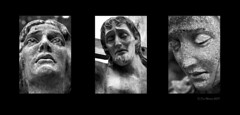
Disciples in statuary. Sadly, some of these stone disciples demonstrate a more dynamic faith than some United Methodists. (Photo credit: Mr. Mofo)
Lately, I’ve been reading a lot of excitement from people like Dan Dick and Ben Gosden. Their excitement is rightly generating some excitement within me as well.
The cause of the excitement? One simple word: Discipleship.
Dan and Ben are both excellent writers. Dan’s edge is experience, and his current mode is “irritated.” Dan has been hearing people talk about discipleship as the mantra for the United Methodist Church for many years now. And he’s kind of sick of hearing about it and seeing very little actually done about it. Ben is younger, but has an old soul; his ideas are well-formed and have an incredible feel of experience about them. He’s well-known throughout the denominations communications outlets and within the United Methodist regions of the blogosphere.
Without sending you back through their archives, I can summarize what I’ve gleaned from their writing in just a few sentences.
- If you aren’t practicing Christianity, you’re missing a great deal of the meaning.
- When you make your religion about telling others why their religion is wrong, you are missing much of the point.
- If you are more excited about worship attendance than about the quality and depth of discipleship in the people you lead, you may have missed the point entirely.
But what does this mean for a practical pastor?
Several things, in fact. Here they are in no particular order — other than the order in which they come to mind.
First, disciple-making is cultural. To live the life of a disciple is to encourage the life of discipleship in those around you. Building a culture of discipleship means inviting people to devotional liturgical reading when they visit the office. Building a culture of discipleship means announcing that you’ll be reading scripture and journaling out in the public venues from time to time and having people join in. And building a culture of discipleship means that you are constantly taking time to form new cultures in the midst of “business and administration committees” like the Trustees and the Committee on Finance.
Disciple-making must also be visible. Disciples in the modern era are practically invisible because we’ve allowed ourselves to think that discipleship is private. And to some extent it should be private. But within our communities, we have a deeper obligation to admit our failings, celebrate our successes, and generate some shared enthusiasm. For most of us, that means tearing back the veil of secrecy and admitting that we sometimes — or even often! — neglect to do our devotional reading, prayer, or works of compassion and justice.
Finally (for now, anyway), disciple-making must be intentional. We cannot allow one another to think that we have achieved some special notoriety simply because of a statement of membership or regular attendance of events at some church somewhere. Our faith must be put to the test. Our lives must be put to the task. And our discipleship must rise above the hodge-podge of ideas we have about God and become the practices of our belief.
Related articles
- John Meunier: Coming to terms with discipleship (methoblog.com)
- Disciples or Consumers? (stevenwwatkins.com)
- Covered in the Masters Dust: The Motion I WISH I Had Made at Annual Conference (methoblog.com)












Good thoughts here, Br. Joey. I have another request, though. Could you alter the design of your blog so that hyperlinks aren’t in red on black? That’s extremely hard to read for those of us with vision disabilities (I have age-related macular degeneration, which has robbed me of some of the ability to distinguish contrast in dark matter). If you like the black background, perhaps you could make your links yellow, or some lighter shade of another color. Thanks on behalf of those whose eyes aren’t what they used to be.